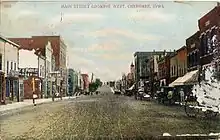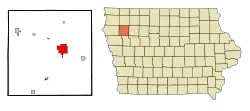Cherokee, Iowa
Cherokee is a city in Cherokee County, Iowa, United States. The population was 5,253 at the 2010 Census, down from 5,369 in 2000. It is the county seat of Cherokee County.[5]

Cherokee, Iowa | |
|---|---|
| Motto(s): "Citizens With a Passion for Community and a Community with Passion for its Citizens!"[1] | |
 Location of Cherokee, Iowa | |
| Coordinates: 42°45′N 95°33′W | |
| Country | |
| State | |
| County | Cherokee |
| Government K | |
| • Type | Mayor-council |
| • Mayor | Craig Schmidt |
| Area | |
| • Total | 6.79 sq mi (17.59 km2) |
| • Land | 6.77 sq mi (17.53 km2) |
| • Water | 0.02 sq mi (0.06 km2) |
| Elevation | 1,194 ft (364 m) |
| Population | |
| • Total | 5,253 |
| • Estimate (2019)[4] | 4,869 |
| • Density | 719.52/sq mi (277.82/km2) |
| Time zone | UTC-6 (Central (CST)) |
| • Summer (DST) | UTC-5 (CDT) |
| ZIP code | 51012 |
| Area code(s) | 712 |
| FIPS code | 19-13080 |
| GNIS feature ID | 0455370 |
| Website | City of Cherokee |
History
Cherokee was laid out as a town in 1870,[6] and was named for the Southeast Indian tribe, most of whose members had been removed to Indian Territory in the late 1830s.[7] Cherokee was incorporated on April 5, 1873.[8]
Geography
According to the United States Census Bureau, the city has a total area of 6.45 square miles (16.71 km2), of which 6.43 square miles (16.65 km2) is land and 0.02 square miles (0.05 km2) is water.[9]
Demographics
| Historical population | |||
|---|---|---|---|
| Census | Pop. | %± | |
| 1870 | 438 | — | |
| 1880 | 1,523 | 247.7% | |
| 1890 | 3,441 | 125.9% | |
| 1900 | 3,865 | 12.3% | |
| 1910 | 4,884 | 26.4% | |
| 1920 | 5,824 | 19.2% | |
| 1930 | 6,443 | 10.6% | |
| 1940 | 7,469 | 15.9% | |
| 1950 | 7,705 | 3.2% | |
| 1960 | 7,724 | 0.2% | |
| 1970 | 7,272 | −5.9% | |
| 1980 | 7,004 | −3.7% | |
| 1990 | 6,026 | −14.0% | |
| 2000 | 5,369 | −10.9% | |
| 2010 | 5,253 | −2.2% | |
| 2019 (est.) | 4,869 | [4] | −7.3% |
| U.S. Decennial Census[10] | |||
2010 census
At the 2010 census there were 5,253 people in 2,316 households, including 1,339 families, in the city. The population density was 817.0 inhabitants per square mile (315.4/km2). There were 2,569 housing units at an average density of 399.5 per square mile (154.2/km2). The racial makeup of the city was 95.5% White, 1.0% African American, 0.3% Native American, 0.7% Asian, 0.2% Pacific Islander, 1.2% from other races, and 1.1% from two or more races. Hispanic or Latino of any race were 2.9%.[3]
Of the 2,316 households 24.6% had children under the age of 18 living with them, 43.9% were married couples living together, 9.6% had a female householder with no husband present, 4.3% had a male householder with no wife present, and 42.2% were non-families. 37.3% of households were one person and 16.9% were one person aged 65 or older. The average household size was 2.14 and the average family size was 2.77.
The median age was 46.3 years. 20.2% of residents were under the age of 18; 7.1% were between the ages of 18 and 24; 21.1% were from 25 to 44; 28.9% were from 45 to 64; and 22.8% were 65 or older. The gender makeup of the city was 48.6% male and 51.4% female.
2000 census
At the 2000 census there were 5,369 people in 2,362 households, including 1,393 families, in the city. The population density was 837.8 people per square mile (323.4/km2). There were 2,556 housing units at an average density of 398.9 per square mile (154.0/km2). The racial makeup of the city was 97.5% White, 0.54% African American, 0.22% Native American, 0.61% Asian, 0.54% from other races, and 0.58% from two or more races. Hispanic or Latino of any race were 1.51%.[11]
Of the 2,362 households 25.9% had children under the age of 18 living with them, 47.3% were married couples living together, 8.6% had a female householder with no husband present, and 41.0% were non-families. 37.3% of households were one person and 19.0% were one person aged 65 or older. The average household size was 2.16 and the average family size was 2.82.
Age spread: 23.2% under the age of 18, 7.2% from 18 to 24, 22.9% from 25 to 44, 24.9% from 45 to 64, and 21.9% 65 or older. The median age was 43 years. For every 100 females, there were 92.3 males. For every 100 females age 18 and over, there were 85.4 males.
The median household income was $31,240 and the median family income was $42,333. Males had a median income of $28,350 versus $21,333 for females. The per capita income for the city was $17,846. About 5.0% of families and 7.0% of the population were below the poverty line, including 10.5% of those under age 18 and 4.5% of those age 65 or over.
Arts and culture
Sites on the National Register of Historic Places
The nearby Cherokee Sewer Site is a well-preserved prehistoric Indian bison-processing site. Findings here have helped to redefine the Archaic period in the Midwest. The Phipps Site is a 1000-year-old indigenous Plains farming village, which may have been fortified. It is designated as a National Historic Landmark.
Annual events
The annual Jazz Festival is held in January, often headlined by Mark Pender, a member of the Basic Cable band.[12][13]
The Cherokee County Fair, and the Cherokee Rodeo are held in the summer.[13]
Creek Fest is an annual summer music festival held along the banks of Mill Creek. Past performers include Kid Rock, The Band Perry, Big & Rich, and Florida Georgia Line.[14]
Museums
Cherokee is the home of the Sanford Museum and Planetarium that opened in 1951. The founders, Mr & Mrs W.A. Sanford, intended to create a museum that was free and open to the public. The facility is currently (January 2011) still operated free to the public and has exhibits and activities on a variety of subjects including: archaeology, art, astronomy, geology, history, natural history, and paleontology.[13]
Cherokee may be the smallest town in the world to have its own symphony orchestra, the Cherokee Symphony. This 60-member orchestra has been referred to as "the best kept secret in Northwest Iowa".[13]
Education
The Cherokee Community School District operates local schools.[15]
Infrastructure
Health care
Cherokee is also the home of the Cherokee Mental Health Institute, under the Iowa Department of Human Services.
Notable people
- Ralph Block, film producer and screenwriter; president of Screen Actors Guild.
- Elwood Brown, basketball coach.
- Wilmer D. Elfrink, football and basketball player.
- Guy M. Gillette, U.S. Representative (1930 - 1936) and Senator (1936 -1945) from Iowa.[16]
- Roger Goeb, composer.[17]
- Kelly Goodburn, NFL punter and Super Bowl champion for Washington Redskins.
- Major General Joseph A. Green, Chief of the Coast Artillery Corps.
- Dan Huseman, member of Iowa House of Representatives.
- Royal C. Johnson, 8th Attorney General of South Dakota, U.S. Representative from South Dakota; highly decorated World War I veteran.
- Matt Koch, MLB baseball player with Arizona Diamondbacks.
- Ben F. Laposky, artist and mathematician.
- Edward Lindberg, Olympic gold medalist in 1912, track and field.
- Steve Melter, baseball player.
- Thomas Miller, Iowa newspaper editor and politician
- Spike Nelson, football player and coach.
- Ken Nordine, voiceover.
- Doug Ohlson, abstract artist.[18]
- Jason Ravnsborg, 31st and current Attorney General of South Dakota.
- Laurence Rickels, theorist and philosopher, studied vampires, the Devil, technology and science fiction.
- General John D. Ryan, US Air Force Chief of Staff, 1969–71.
- Francis L. Sampson, Army officer whose rescue of young soldier inspired film Saving Private Ryan.
- Harold D. Schuster, editor and film director.
- Adam Timmerman, NFL lineman and Super Bowl champion for St. Louis Rams and Green Bay Packers.[19]
- Steven VanRoekel, second Federal Chief Information Officer of the United States[20]
- Stanton Warburton, U.S. Representative from Washington; moved to Cherokee.
- TJ Hockenson, tight end for the Detroit Lions
References
- "City of Cherokee, Iowa". City of Cherokee, Iowa. Retrieved September 2, 2012.
- "2019 U.S. Gazetteer Files". United States Census Bureau. Retrieved July 17, 2020.
- "U.S. Census website". United States Census Bureau. Retrieved 2012-05-11.
- "Population and Housing Unit Estimates". United States Census Bureau. May 24, 2020. Retrieved May 27, 2020.
- "Find a County". National Association of Counties. Archived from the original on 2015-05-09. Retrieved 2011-06-07.
- History of Western Iowa, Its Settlement and Growth. Western Publishing Company. 1882. pp. 267.
- "Profile for Cherokee, Iowa, IA". ePodunk. Archived from the original on June 12, 2017. Retrieved September 2, 2012.
- "Cherokee, Iowa". City-Data.com. Retrieved September 2, 2012.
- "US Gazetteer files 2010". United States Census Bureau. Archived from the original on 2012-01-25. Retrieved 2012-05-11.
- "Census of Population and Housing". Census.gov. Retrieved June 4, 2015.
- "U.S. Census website". United States Census Bureau. Retrieved 2008-01-31.
- http://www.cherokeejazzbluesfestival.com/Home.html. Retrieved May 17, 2010. Missing or empty
|title=(help) - "Activities & Recreation". Cherokee Iowa Chamber of Commerce. Archived from the original on 2011-07-08. Retrieved 2011-01-04.
- "Creek Fest". Creek Fest Music Festival. Archived from the original on 2014-10-15. Retrieved 2016-04-15.
- "FY20_SCHEROKEE" (PDF). Iowa Department of Education. Retrieved 2020-08-05.
- "Gillette, Guy Mark, (1879 - 1973)". Biographical Directory of the United States Congress. Retrieved September 2, 2012.
- "Roger Goeb". American Composers Alliance. Retrieved September 2, 2012.
- Smith, Roberta. "Doug Ohlson, Painter of Vivid Abstracts, Dies at 73", The New York Times, July 23, 2010. Accessed July 24, 2010.
- "Adam Larry Timmerman". Pro-Football-Reference.Com. Retrieved September 2, 2012.
- Schmidt, Steffen. "Iowa Boy Makes Good" Archived 2012-01-26 at the Wayback Machine
External links
| Wikimedia Commons has media related to Cherokee, Iowa. |
- City of Cherokee, Iowa Website Portal style website, Government, Business, Library, Recreation and more
- City Data — comprehensive statistical data, etc., about Cherokee